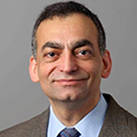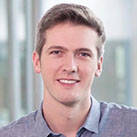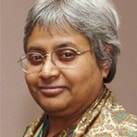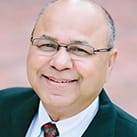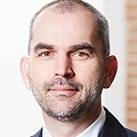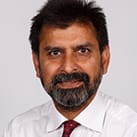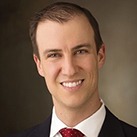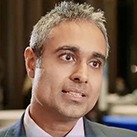Academic collaborators
Samer Faraj
Canada Research Chair in Technology, Management, and Healthcare, McGill University
Samer worked in a variety of IS and technology consulting roles prior to his doctorate in MIS from Boston University. His current research interests include: how IT transforms work and the provision of health care, the coordination of expertise in settings such as trauma care and software development teams, and the participation dynamics of online knowledge communities and is working with Michael Barrett.
Michael Freeman
Assistant Professor of Technology and Operations Management, INSEAD
Michael Freeman is an Assistant Professor of Technology and Operations Management at INSEAD. He received his MPhil and PhD in Management Science and Operations from the University of Cambridge, and his BSc and MSc in Mathematics, Operations Research, Statistics, and Economics from the University of Warwick.
Bob Hinings
CLAHRC Fellow
Bob Hinings is a Professor Emeritus at the University of Alberta. He is a Fellow of the Royal Society of Canada, a Fellow of the US Academy of Management and an Honorary Member of the European Group for Organization Studies. He has carried out long-term research on the restructuring of healthcare in Canada and was a Board Member of SEARCH Canada, a healthcare knowledge transfer organisation. Bob is working on knowledge exchange and service innovation with Professor Michael Barrett and Dr Eivor Oborn.
Shervanthi Homer-Vanniasinkam
Visiting Fellow in Marketing
Professor Shervanthi Homer-Vanniasinkam is a consultant vascular surgeon and Professor of Translational Vascular Medicine at the Leeds Vascular Institute and the Leeds Institute of Genetics, Health & Therapeutics (LIGHT).
Rajiv Kohli
John N Dalton Memorial Professor of Business, Raymond A Mason School of Business, The College of William & Mary
Rajiv Kohli has worked in healthcare, telecommunications and manufacturing with research interests including Business Value of Information Technology, Healthcare Information Systems, and Managing Innovation with Information Technologies.
Ludwig Kuntz
Chair of the Department for Business Administration and Health Care Management, University of Cologne
Professor Kuntz’s primary research interest is in hospital management. Prior to his academic career, Ludwig spent over ten years as a practicing manager, including seven years as Head of Controlling of the University Hospital Hamburg. Professor Kuntz has joined forces with Stefan Scholtes to establish a research programme in operations strategy for health care providers.
Fellows in Health Management
Jag Ahluwalia
Fellow in Health Management
Chair of the Board, Royal Papworth Hospital, Cambridge
Dr Jag Ahluwalia graduated in medicine having studied as an undergraduate at the University of Cambridge and in London. He initially trained in general practice but then developed an interest in paediatrics and in particular in newborn intensive care. Following postgraduate clinical and research training in neonatology in Cambridge and Melbourne he was appointed to the consultant staff at Addenbrookes and the Rosie in 1996 within the regional neonatal intensive care unit.
Alongside his clinical practice Jag became increasingly involved in clinical management as unit director, then associate medical director for the trust and then Executive Medical Director, a role he held for nearly 10 years. During his time as Medical Director he has served as Co-Chief Operating Officer, Director of Infection Prevention and Control, Executive lead for Research, Executive Lead for Medical Education and Executive Lead for IT. He also served for many years as clinical lead for the Norfolk, Suffolk and Cambridgeshire neonatal network and as a senior officer of the British Association of Perinatal Medicine for six years. National and regional management roles have included serving as Vice-Chair for NHS Employers’ Consultant Contract Negotiation Team, Chair of Monitor’s Medical Director Advisory Group and as Chair of the East of England Medical Directors’ Forum. Latterly he has served on the National Consultant Clinical Excellence Awards Committee as well as various other invited advisory roles.
His published research interests have included neonatal ventilation, the use of nitric oxide in newborns, ethical dilemmas in neonatology and long-term follow-up. He has lectured extensively on these topics as well as in the area of clinical management and leadership and directs or co-directs major training programmes in clinical leadership. He is now the Director of Digital at Cambridge University Hospitals and a Trustee at Macmillan Cancer Support. He graduated with an MBA from Cambridge Judge Business School in 2017 (Executive MBA, class of 2015).
David Champeaux
Fellow in Health Management
Partner, Enterprise AI and Health and Life Sciences, Infosys Consulting
David Champeaux over his career has synergistically woven together roles as a digital and AI entrepreneur, and as advisor to private and public organisations globally, to pursue a mission of driving sustained performance outcome improvements for all stakeholders in health and care ecosystems, with a focus on converting data into actionable insights delivered in the right context to empower and augment human agents.
A Graduate of HEC School of Management in Paris, David has held founder, leadership, and advisory roles at more than a dozen startups, starting in the late 90s, including: an entrepreneur-in-residence role at UK contextual decision intelligence platform unicorn Quantexa to shape their health and social care offering; partnering with Australian startup Evidentli to drive normalisation of healthcare data into the global standard OMOP at scale and near-perfect accuracy; advising UK startup MiiCare on deploying their LLM-enabled AI voice conversational agent in support of older people in their homes; or developing Boston-based startup Cherish Health’s AI and radar-enabled solution to monitor the movements of older people in their homes.
As a partner at advisory and professional services firms such as McKinsey, Accenture, Alvarez & Marsal, and now Infosys, David has worked extensively with national and regional health systems and their ecosystem partners (payors, providers, life sciences and technology providers) to help design the conditions for sustainable and scalable transformations in performance and outcomes enabled by technology innovations – which invariable hinge on designing novel models of organisation, governance and incentivisations, which David has had the pleasure of exploring in collaboration with colleagues at the CCHLE over the past few years.
Don Drakeman
Fellow in Health Management
Venture Partner, Advent Ventures Life Sciences, Advent Venture Partners
Don Drakeman is an entrepreneur, executive, and educator who co-founded two leading biotech companies, Medarex and Genmab. Under his two decades of leadership as CEO, Medarex raised over a billion dollars, formed alliances with many pharmaceutical companies, developed therapeutic products, and spun-off Genmab, which completed Europe’s largest biotech IPO. He is currently a Venture Partner with Advent Venture Partners, a London-based venture capital firm. Don is working with a team of Cambridge Judge Business School academics to develop a research agenda on new product development and R&D productivity in the pharmaceutical industry.
Lisa Drakeman
Fellow in Health Management
Vice Chair, Zucker Institute for Innovation Commercialization
Lisa is the Vice Chair of the Zucker Institute for Innovation Commercialization, the technology transfer arm of the leading biomedical research institution in South Carolina, where she works with entrepreneurs and researchers to develop new medical products and technologies.
She is a co-author of the book ‘From Breakthrough to Blockbuster: The Business of Biotechnology’, a Financial Times Top Business Title, and co-author of the forthcoming book ‘Tackling the Innovation/Affordability Conundrum: How Entrepreneurs are Making Medicine More Innovative, Accessible and Affordable’.
Lisa was the founding CEO of Genmab, a Danish biotech company that created FDA-approved medicines for cancer and Multiple Sclerosis. Awards include Scrip’s Biotech Company of the Year, and the Watson Helix Award for leadership in innovation and citizenship. Lisa pioneered a Women’s Walking and Weight Loss Wellness program when she was Chair of Volunteers in Medicine, a large free clinic for the underserved. Seeing that >90% of the women patients had heart disease risk factors, Lisa designed a programme combining health education, pedometers, modest incentives, peer support, and a focus on patient accomplishments to build self-esteem.
Carter Dredge
Fellow in Health Management
Executive Director, Intermountain Health Institute
Pam Garside
Fellow in Health Management
Consultant, Newhealth
Pam Garside has had a career in health care systems and digital health in the UK and internationally and is an angel investor in early-stage health tech companies. She is a Fellow at Cambridge Judge Business School, University of Cambridge and a member of the Investment Committee of Cambridge Enterprise. Pam is Chair of Cambridge Angels and sits on the board of Albion Crown Venture Capital Trust. She founded and co-chairs The Cambridge Health Network, a membership group of senior players in the UK health sector. Pam advises a number of life science companies, health technology accelerators and startups in the UK and Europe.
Richard Mason
Fellow in Health Management
CEO, Apollo Therapeutics
Dr Richard Mason is Apollo Therapeutics’ chief executive officer. Richard has over 20 years’ experience in the biopharmaceutical industry, including leading Johnson & Johnson Innovation in Europe. Before this, he was CEO of novel anticoagulant antibody company XO1 until the company was acquired by Janssen in March 2015. Previously, Richard was the executive leadership team member responsible for strategy and business development at listed companies BTG Plc and Cambridge Antibody Technology Plc where he led numerous M&A and partnering transactions. Richard received degrees in medicine from St Bartholomew’s Hospital Medical College and immunology from University College London and trained in internal medicine in London. During 2020, he served on active duty with the British Army as part of the UK government’s pandemic response, including as a member of the UK Vaccines Task Force.


